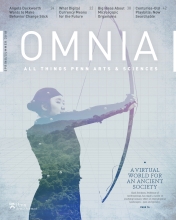Between 1990 and 2016, men won 60 percent of three major U.S. awards—the National Book Award, the Pulitzer Prize, and the National Book Critics Circle award. English major Savannah Lambert, C’18, is using digital technology to learn more about why books by and about women are less likely to win.
“I became really interested in this project because, as much as some might argue that awards are silly or that no one can objectively say ‘What is good literature?,’ these awards are important and they do make a difference in an author’s sales,” she says. “What does that say about the kinds of voices we value?”
She used Python, an open-source programming language, to look at the text of the books to see if there were any objective differences between male and female authors, such as numbers of adjectives used. “I really didn’t find any significant difference based on gender, which I think in itself says something.”
Her findings show that not only do women win these awards less frequently, but that books by women and men are less likely to win if they focus on women or girls as the main characters. Books written by women that win awards tend to focus on male characters—a split that doesn’t exist for the male authors.
Lambert is also examining the genders of the members of the committee who chose each year’s award. Beyond that, she wants to do case studies of a few “particularly salient” years. Ultimately, she says, “I would never claim that there’s a single definitive cause of the gender gap we’re seeing among award winners, but my findings could provide one telling explanation for a certain gendered bias or trend we see. The first step is just pointing out what the issues are.”



